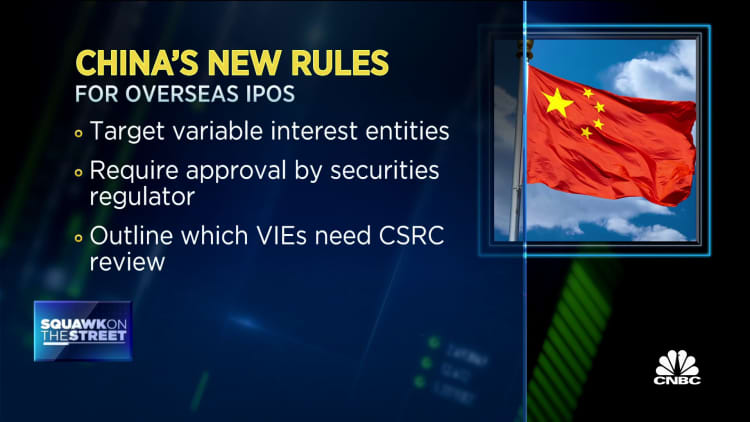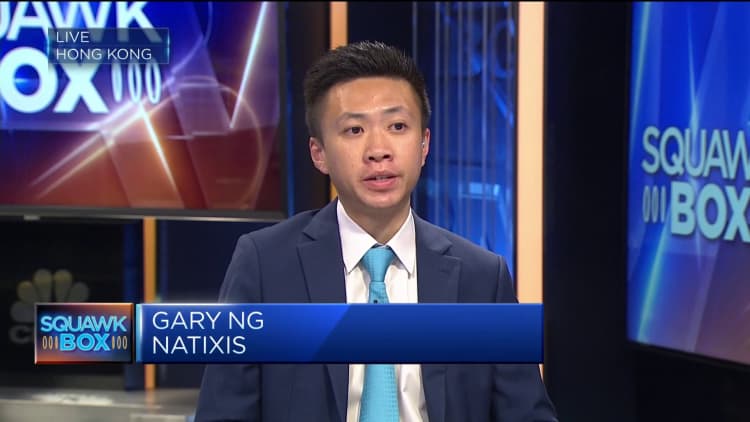[ad_1]
The Hong Kong Stock Exchange in Hong Kong, China, on Wednesday, July 13, 2022.
Paul Yeung | Bloomberg | Getty Images
Hong Kong’s largest IPO so far this year flopped last week suggesting the market still needs time to rebound, despite positive signs pointing to a recovery.
The offering raised $675.2 million, but shares of KKR & Co.-backed Chinese liquor company ZJLD Group plunged nearly 18% on their first day of trading on April 27.
“The sentiment in the IPO markets has not built up yet,” Ringo Choi, Asia-Pacific IPO leader at EY, told CNBC.
“A lot of industries are suffering at the moment,” said Choi, noting that tech companies are facing pressure from U.S.-China tensions and falling electric vehicle prices, among other setbacks.
“Valuations at this moment have not picked up as compared to two to three years ago. We still need some time,” said Robert Lui, Hong Kong offering leader of Deloitte China’s Capital Market Services Group.
Hong Kong’s stock market was among the worst-performing last year, shedding 15% in 2022 for its third-straight year of declines.
Besides high inflation and rising rates globally, stocks were also weighed down by Beijing’s zero-Covid strategy and a property market slump in the city. Chinese companies tend to launch secondary listings in Hong Kong as another venue to access investors and capital.
Irene Chu, partner at KPMG China, said the “underlying economy is not doing well.”
“The concern is still about the high interest rate environment and a lot of the attention in the Greater China region is about the recovery of the economy,” said Chu.
Hong Kong’s two largest IPOs in 2022 sunk in their trading debuts. Chinese automobile manufacturer Zhejiang Leapmotor slumped 34% while property management service provider Onewo slid almost 7%.
The Hong Kong IPO market also started 2023 at a slow pace. In the first quarter of 2023, the city hosted 18 IPOs raising 6.6 billion Hong Kong dollars ($840 million), versus 15 IPOs raising HK$13.6 billion in the same period a year ago, according to Deloitte data. While deal volume rose 20%, deal value plunged 51%.
“This slow performance is in line with our forecast. It will take time for business and economic activities, especially between the Chinese Mainland and Hong Kong, to fully revive after the reopening of the boundaries, and eventually market valuations and IPO activity will follow suit,” said Lui in a Deloitte China Q1 2023 report.
Bullish for 2023

Those analysts also expect the upcoming IPOs of Alibaba’s business units to lift the Hong Kong stock exchange this year.
The Chinese tech giant broke into six separate units so that each unit, except Taobao Tmall Business Group, can pursue individual listings — a signal that the Chinese government is softening its grip on tech giants. Its logistics arm Cainiao and grocery business Freshippo are reportedly among the first units to go public. Alibaba has not directly confirmed these plans.
Deloitte’s Lui told CNBC that the “current market is much better as compared to the fourth quarter of 2022,” with the potential deals that are looking to launch on the Hong Kong bourse.
“[The Alibaba spinoff] will definitely improve the market sentiment and that’s why we forecasted that September to December will be better,” said EY’s Choi.
“We expect second half of 2023 to be an exciting time for the Hong Kong IPO market with expectations of the end of U.S. interest rate hikes leading to a repositioning of funds’ investment strategies to Asia’s high-growth regions like China,” Edward Au, Southern Region managing partner at Deloitte China, said in the firm’s first quarter China report.
Deloitte’s Capital Market Services Group forecasts that in 2023, Hong Kong will see 110 new listings raising about HK$230 billion ($29 billion).

[ad_2]

